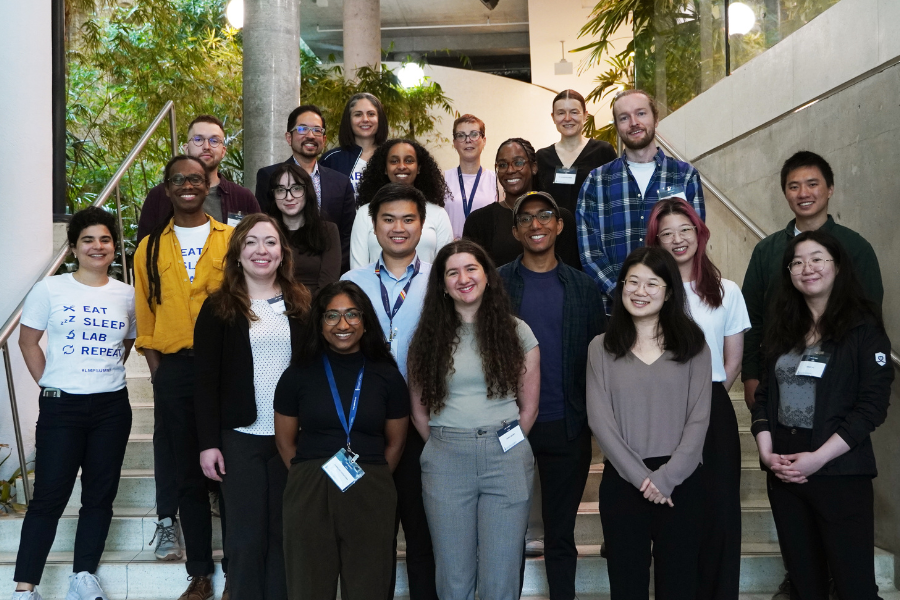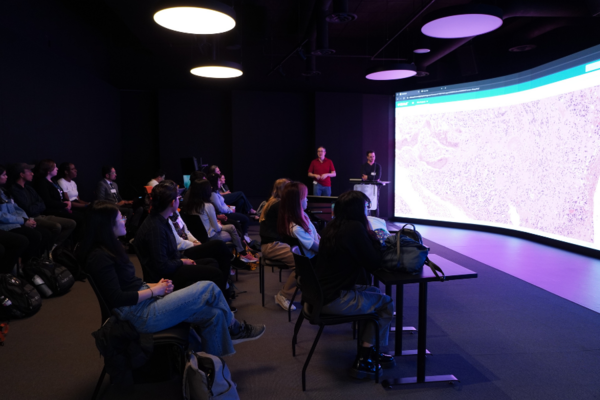
Despite Laboratory Medicine being a large and varied part of healthcare, contributing to an estimated 80% of clinical decisions for patients, it is an area often omitted from or not emphasized in MD curricula. Medical students-in-training are, in many cases, reliant on discovering laboratory medicine through extracurricular activities or if they happen to choose an elective in a laboratory medicine subject.
“It’s a known issue in our field,” explains Dr. Larissa Liontos, Hematopathologist at Sunnybrook Hospital and Hematological Pathology Residency Training Program Director in the Department of Laboratory Medicine and Pathobiology. “As the curriculum has changed in medical schools, we’ve seen subjects like pathology get less and less coverage – in some schools it isn’t included at all.”
“Not only does this limit the career choices of medical students, but also means that future doctors risk having less of an understanding of how the clinical laboratory informs patient care,” adds Dr. Susan Poutanen, Medical Microbiologist and Infectious Diseases Physician at Mount Sinai Hospital/University Health Network and Associate Professor in LMP.
Liontos and Poutanen had the opportunity to discuss this challenge with colleagues Dr. Carlo Hojilla (Pathologist at Mount Sinai Hospital and LMP Assistant Professor) and Dr. George Yousef (Program Medical Director of the Laboratory Medicine Program at the University Health Network and Vice Chair, Clinical Education in LMP) at the LMP Faculty Development Day last year. As part of a competitive departmental process (Faculty Development Day Catalyst competition), they put together a successful proposal for seed funding.
“With Laboratory Medicine, the best way to understand it is to experience it first-hand. We can’t bring lots of medical students into the clinical laboratories, so we came up with a way to bring the labs to the students,” explains Hojilla.
That solution was the LMP Summit - an immersive weekend for MD students across Canada to learn more about Lab Medicine. The aim was to showcase this vital area of healthcare at no charge, to reduce barriers that may be in the way of MD students discovering the field.

The team brought in colleagues from across LMP clinical programs, including faculty and residents. The MD students heard from the program directors about their fields, why they chose them, and details about training and career pathways. Residents shared their ‘day in the life’ experiences giving insights into what it’s like being a Lab Medicine trainee.
Students loved the use of the Visualization Facility in the Myhal Centre for Engineering Innovation & Entrepreneurship where participants could get up close with histology, hematopathology, and microbiology images. Faculty members led a session there exploring cases and role-playing scenarios.
There were also trivia and other fun games related to clinical laboratories to introduce new concepts and let everyone get to know each other. Networking and meeting trainees and faculty was an important component of the weekend, including at a dinner on Saturday night.
In another session, they got to experience the ‘detective’ side of Lab Medicine as they followed a case from Hematopathology, to Pathology, and finally Microbiology, to be able to make a diagnosis. Each specialty showcased the importance of teamwork, curiosity and problem solving in diagnosing cases. They then finished the weekend rotating through breakout sessions that explored aspects such as AI and digitization.
The students left with goodie bags created by Postgraduate Program Administrator, Paula Nixon, who organized all the logistics for the weekend.
One of the MD students who attended commented, “I attended the LMP summit because although you hear about Lab Medicine in medical school, I didn't have much exposure to it clinically. The event was a great way to explore the field and helped me to understand what the day-to-day work looks like for a Lab Medicine specialist. Although there is a stereotype that lab specialists are working hard in a basement away from patients or any other clinicians, there is a surprising amount of collaboration required in the field and the idea of working with other doctors in a multidisciplinary effort to get patients the best care sounds quite rewarding!”
“It was fantastic to see this all come together after a full year of planning. We got very positive feedback, with all the students now interested in exploring Lab Medicine further and perhaps completing an elective or even applying for a residency which is an amazing result. It’s so vital to get medical students in a room with a Laboratory Medicine physician so they can understand the passion we have for the important roles we play in patient care. We can’t wait to invite more students back next year!” says Liontos.
The summit provided a unique opportunity to learn from experts, engage in hands-on activities, and interact with peers who shared similar interests. The most surprising thing I learned was the breadth and depth of lab medicine. It isn't just about running tests and examining specimens under a microscope; it involves critical thinking, decision-making, and complex problem-solving. Each case is like a mystery that needs to be solved using clues from the patient’s history, physical exam, and specimen. Lab medicine is also highly collaborative, with numerous opportunities to work with colleagues on interesting and complex cases to provide the best patient care.2nd year MD student, U of T
The most surprising thing I learned was the degree of automation for specific aspects of the medical microbiology lab at Mount Sinai. To other students that have not heard of lab medicine specialties, I would tell them that there is much more to the specialties than what we are exposed to in class, and I would encourage them to shadow a specialist to see how it really is. I think they will find it is much more interesting than they had expected.4th year MD student, McGill University
This story showcases the following pillars of the LMP strategic plan: Inclusive Community (pillar 1), Dynamic Collaboration (pillar 2) and Agile Education (pillar 5).